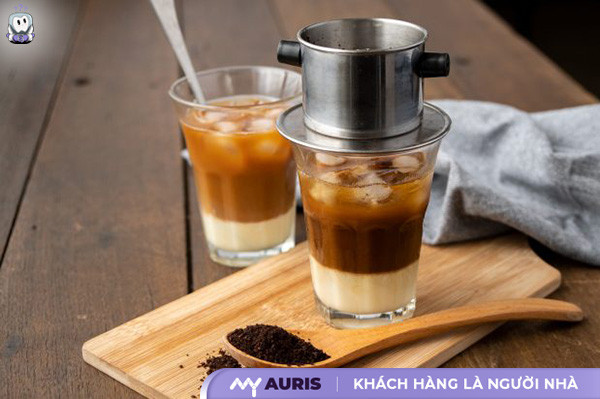Before drinking milk coffee daily, many people often wonder: how many calories are in a glass of milk coffee? Does it cause weight gain? Does frequent consumption affect health and diet? Understanding the calorie content will help you be more proactive in weight management and choosing the right type of coffee for your body’s needs.
How Many Calories Does a Glass of Milk Coffee Contain?
A traditional phin-brewed iced milk coffee (approximately 200-240ml) using condensed milk typically contains 120 to 180 kcal. This calorie amount can increase or decrease depending on the type of milk, the amount of sugar, and the size of the glass. Compared to unsweetened black coffee (only 2-5 kcal), milk coffee provides significantly higher energy.
A regular glass of milk coffee is a quick and popular source of energy in the morning. However, for those monitoring a low-calorie diet, consuming milk coffee too frequently can cause weight gain if the portion is not balanced. The calorie content in milk coffee mainly comes from condensed milk and sugar. One tablespoon of condensed milk (about 20g) contains approximately 65–70 kcal. If you make a glass with 2 tablespoons of condensed milk, the calorie count already approaches 130–140 kcal, not including any added sugar or fresh milk. Bạc xỉu – a variation of milk coffee with a higher milk-to-coffee ratio – can be even higher, up to 150–220 kcal per glass.
Conversely, a glass of unsweetened black coffee (approximately 150–200ml) contains only 0 to 5 kcal. This is an ideal choice if you are looking to lose or maintain weight. Nevertheless, milk coffee remains appealing due to its sweet and creamy taste blended with a slight bitter aftertaste, making it hard for many to resist.

When brewing stronger coffee, with a coffee to milk ratio of 2:1 or 3:1, the calorie content tends to be lower.
Which Factors Affect the Calorie Content in Milk Coffee?
The calorie content in a glass of milk coffee is not fixed but depends on 5 main factors: the type of milk used (condensed milk, fresh milk, plant-based milk), the coffee-to-milk ratio, the amount of added sugar, the size of the glass, and even the time of day it is consumed.
In reality, the calorie content in a glass of milk coffee can vary significantly. Understanding these factors helps you adjust your consumption habits to suit your diet:
How Does the Type of Milk Used Affect Calorie Content?
Sweetened condensed milk is the richest source of calories (approximately 65 kcal/tablespoon). Conversely, unsweetened fresh milk (~62 kcal/100ml) or unsweetened plant-based milks like almond milk (~40 kcal/100ml) are significantly lower-calorie options.
The first factor that strongly impacts calorie content is the type of milk. If you use sweetened condensed milk, each tablespoon can contain about 65 kcal. A traditional iced milk coffee using 2–3 tablespoons will result in 130 to 195 kcal just from the milk alone. Meanwhile, if replaced with unsweetened fresh milk, the calorie count will significantly decrease. Ông Thọ condensed milk is a popular brand in Vietnam, often used in bạc xỉu and iced milk coffee. This type of milk creates a distinct creamy flavor but causes calories to increase rapidly. Those looking to lose weight should prioritize low-fat fresh milk or unsweetened plant-based milk.
How Does the Coffee-to-Milk Ratio Determine Calorie Content?
The higher the milk ratio, the more calories. A glass of bạc xỉu with a milk-to-coffee ratio of 3:1 can contain up to 220 kcal, while milk coffee with a 1:1 or 2:1 ratio (more coffee) will have lower calorie content.
The ratio between coffee and milk is also a determining factor. If you brew at a 1:1 ratio, there will be more milk, rapidly increasing calories. When brewing stronger coffee, at a 2:1 or 3:1 ratio (coffee:milk), the calorie content tends to be lower. Specifically for bạc xỉu, the milk ratio can make up 70–80%, bringing the total energy up to 200–220 kcal per glass. This is a clear difference compared to unsweetened black coffee, which only contains 0–5 kcal.
How Many Calories Does Added Sugar Contribute?
Each teaspoon of sugar (approximately 4-5g) contains about 16-20 kcal. Adding 1–2 spoons to an already sweet glass of milk coffee can unnecessarily increase the total calorie count by 30-40 kcal.
Milk coffee already has sweetness from condensed milk. However, many people still add sugar to enhance the flavor. This not only increases the total calorie count but also affects blood sugar levels, impacting insulin and feelings of hunger and fullness. Drinking coffee with too much sugar can easily make you crave food and make it difficult to maintain a diet.
How Does Glass Size Affect Total Calories?
A larger coffee glass (size L, >250ml) will contain more milk and sugar, potentially pushing the calorie count over 200 kcal. Conversely, a smaller glass (size S, <200ml) with more ice will reduce the amount of milk and sugar, helping to better control calories.
A 200 ml glass of milk coffee can contain 120–180 kcal. If the glass is larger than 250 ml and has less ice, with a concentrated milk and sugar ratio, the total calories can exceed 200. Conversely, if you use a smaller glass with more ice, the calorie count will significantly decrease. This is a practical factor often overlooked when calculating energy. A seemingly simple morning drink can impact your physique if you choose the wrong size.
Experience a Perfect Smile!
Don’t let dental worries make you lack confidence. Let our team of experts advise you on the best solution.
Are the Time and Frequency of Drinking Important?
Yes. Drinking milk coffee in the morning helps the body expend energy throughout the day. Drinking it in the evening can cause insomnia due to caffeine, indirectly affecting metabolism and leading to weight gain. Drinking 1-2 glasses daily without exercise can lead to calorie accumulation.
The habit of drinking milk coffee in the evening can reduce sleep quality due to caffeine. Furthermore, if you continuously drink 1–2 glasses of sweetened milk coffee daily without adjusting your diet or increasing physical activity, the likelihood of weight gain is very high. Drinking it in the morning, combined with controlled meals and a scientific exercise schedule, will help you balance energy. If consumed correctly, milk coffee can still be suitable for people on a diet.
How Do Calories Compare Between Milk Coffee, Bạc Xỉu, and Black Coffee?
Black coffee is the lowest-calorie option (0-5 kcal). Milk coffee has an average calorie level (120-180 kcal). Bạc xỉu contains the most calories (150-220 kcal) due to its highest proportion of condensed milk and sugar among the three types.
Not understanding these differences can lead you to unknowingly choose a high-calorie drink, causing weight gain even if you think you’re just “drinking to stay awake.” Especially for those on a diet, choosing the wrong type of coffee can make weight loss efforts counterproductive. Below is a detailed comparison table of the three most popular types of coffee:
| Type of Coffee | Average Calories | Sugar Content | Milk Content | Notes |
|---|---|---|---|---|
| Milk Coffee | 120–180 kcal/glass | 10–20g | 30–50ml condensed milk | Coffee mixed with condensed milk, distinctly sweet flavor. |
| Bạc xỉu | 150–220 kcal/glass | 15–25g | 50–70ml condensed milk | Higher milk to coffee ratio (usually 3:1). |
| Black Coffee | 0–5 kcal/glass | 0g | 0ml | No sugar, no milk. |
Does Drinking Milk Coffee Make You Fat (Gain Weight)?
Yes, drinking milk coffee can cause weight gain if consumed uncontrollably. The high-calorie content from condensed milk and sugar, if not fully burned off through physical activity, will accumulate as excess fat, especially when drinking multiple glasses daily or consuming it in the evening.
Drinking milk coffee can make you gain weight if you don’t control your daily calorie intake. On average, 1 glass of milk coffee contains about 120–180 kcal. If you add more sugar or drink multiple glasses daily, the total calorie count will exceed what’s needed, leading to energy surplus and weight gain over time. Many people think that because coffee helps them stay awake, it will support metabolism and weight loss. However, this is only true for unsweetened black coffee. Meanwhile, sweetened milk coffee easily leads to consuming empty calories, which don’t create a feeling of fullness but still significantly increase overall energy intake.
If you drink milk coffee in the morning, your body can burn off some of the calories consumed. But if you drink it in the evening or after a full meal, excess energy will accumulate as fat. Additionally, caffeine in coffee can stimulate the nervous system, affect sleep, disrupt the metabolic cycle, and thereby indirectly cause weight gain.
So, Can Drinking Milk Coffee Help with Weight Loss?
Possibly, but it must be consumed correctly. Drinking milk coffee to support weight loss requires adjusting the recipe (reducing condensed milk, no sugar), drinking it at appropriate times (morning, after a light meal), and combining it with a balanced diet and an active lifestyle.
Drinking milk coffee can support weight loss if you know how to adjust the brewing ratio, choose low-calorie ingredients, and incorporate it into a reasonable diet. Caffeine in coffee has been shown to boost metabolism and fat burning. However, if not well-controlled, the sugar and milk content can make your weight loss plan counterproductive. Balance is the key; it’s not about complete elimination but optimizing your drinking habits.

Reduce the amount of condensed milk or replace it with unsweetened fresh milk to lower calories.
How to Drink Milk Coffee Reasonably Without Worrying About Weight Gain?
To drink milk coffee without gaining weight, follow these 5 principles: reduce condensed milk, cut out sugar, drink in the morning, do not drink on an empty stomach, and balance your total daily calorie intake with exercise.
Some people choose to drink bạc xỉu instead of milk coffee, thinking it has fewer calories. However, in reality, bạc xỉu has a higher content of condensed milk and sugar. To enjoy milk coffee in a healthy way, you can consider the following methods:
1. Reduce the amount of condensed milk in your coffee
One tablespoon of condensed milk can contain ~65 kcal. If you usually use two tablespoons, reduce it to 1 tablespoon or replace it with unsweetened fresh milk to lower calories while maintaining the flavor. This is an effective way to reduce daily calorie intake without giving up your preference.
2. Limit or cut down on sugar
Adding sugar increases unnecessary energy and leads to excess fat accumulation. For those managing weight, choosing unsweetened milk coffee or using calorie-free alternative sweeteners will help maintain coffee-drinking habits without exceeding recommended energy levels.
3. Prioritize drinking in the morning
Milk coffee, when consumed in the morning, helps increase alertness and burn calories better due to daily activities. Avoid drinking after 2 PM to prevent affecting sleep quality, which can indirectly lead to weight gain.
4. Do not drink on an empty stomach
Many people have a habit of drinking milk coffee before breakfast. However, caffeine can cause stomach discomfort, stimulate insulin secretion, and make you crave food more easily. Drink after a light meal to control calorie absorption and help you feel full longer.
5. Exercise regularly and monitor total calorie intake
If each glass of milk coffee contains 150 kcal, you should compensate with light physical activity such as a 30-minute walk. Additionally, use calorie-counting apps to better control your total daily energy intake, especially if you regularly consume milk coffee.
Need More Dental Health Advice?
Contact us now for free consultation and to book an appointment with leading experts.






